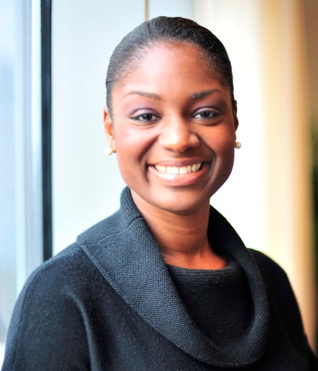 Ajenai Clemmons is a Ph.D. Candidate in public policy with a concentration in political science at Duke University. Her academic research focuses on the most important factors that help and harm the police-community relationship, focusing especially on African Americans and European Muslims. Ajenai’s dissertation uses comparative in-depth interviews between young Black men in the U.S. and young Muslim men of Bangladeshi background in the U.K. to answer research questions about civilian preferences in policing, civilian assessment of police performance, and civilian responses to policing. In her other research, she has conducted a national survey experiment to test the effect of perceptions of African Americans on civilian preferences for police reforms, and she has examined police fatalities of civilians in the United States and systemic barriers to accurate reporting of deaths.
Ajenai Clemmons is a Ph.D. Candidate in public policy with a concentration in political science at Duke University. Her academic research focuses on the most important factors that help and harm the police-community relationship, focusing especially on African Americans and European Muslims. Ajenai’s dissertation uses comparative in-depth interviews between young Black men in the U.S. and young Muslim men of Bangladeshi background in the U.K. to answer research questions about civilian preferences in policing, civilian assessment of police performance, and civilian responses to policing. In her other research, she has conducted a national survey experiment to test the effect of perceptions of African Americans on civilian preferences for police reforms, and she has examined police fatalities of civilians in the United States and systemic barriers to accurate reporting of deaths.
For the past four years, Ajenai has traveled to Europe to engage with police practitioners, activists, community and religious leaders, and academics on police-community relations in the U.K., Spain, Belgium, the Netherlands, and Montenegro. She has also conducted trainings on coalition-based advocacy for inclusive policies in Belgium, Italy, Germany, and France.
From 2010-2015, Ajenai served as Policy Director of a national association of 700 African-American state legislators based in Washington, D.C., overseeing all policy programming and communications as well as brokering meetings with the White House, Administration, and Congress. Prior to becoming policy director, she helped establish a new government agency with the City and County of Denver. Ajenai served five years as Community Relations Ombudsman at the Office of the Independent Monitor, a civilian agency overseeing internal affairs investigations for Denver’s police and sheriff departments. She has served on several boards of directors, including the Women’s Foundation of Colorado as an officer. Ajenai earned her B.A. in International Relations, Latin American History, and Spanish at Drake University and her Master of Public Policy at the University of Denver.
Here we ask her a few questions about her experiences:
Q: What projects are you currently working on?
I am currently working on two research projects. In the first, I examine fatalities of civilians by law enforcement, advance a typology of deaths, and analyze the likelihood that certain types of deaths will be categorized accurately by the government. I offer policy recommendations to improve both the accuracy of reporting and classification as well as potentially change the way in which police fatalities are defined and counted. My second study is based on in-depth interviews of young men living in more heavily policed areas relative to fellow city residents. My questions help me understand what they desire from police in terms of safety, how they assess police performance, and their responses if they determine police have not met their expectations. I compare African American men in the U.S. to Muslim men of Bangladeshi background in the U.K.
Q: Who has had the greatest influence on your research and/or career?
In my previous capacity advising legislators, I had the tremendous fortune of learning from collaborating scholars Dr. Manuel Pastor, a demographer and economist from USC; law professor Sharon Davies, now the Provost of Spellman College; and law professor john a. powell, who now heads the Haas Institute for Fair and Inclusive Society at Berkeley. Not only did I receive direct training from them on structural racism, unconscious bias, and multi-ethnic political mobilization, I teamed up with my counterparts who advised legislators in sister organizations to arrange joint trainings by these public scholars. I was inspired by the capacity of scholars to educate and empower policymakers to become more effective.
Q: What is the best career advice you have ever received?
“Leverage your unique strengths and build on your expertise.” After 13 years working full time and having graduated from a master’s program that successfully prepared me to lead policy organizations more than produce academic research, I underwent shock my first semester in the Ph.D. program. My advisors assured me of my valued experience and analytical perspective in the program and encouraged me to begin there. Just because I was learning from scratch on several fronts did not mean I had to learn from scratch on every front! This led me to focus on my passion—improving police-community relations, an area in which I have a decade of related professional experience.
Q: Do you have a favorite writing resource or process to keep you motivated?
I really enjoy reading the National Center for Faculty Development and Diversity tips and advice. There is always some timely information that helps me to focus on the right things as well as allocate my time and energy.
Q: Do you have work/life balance secret you’d like to share?
I’ve gotten a lot better at saying no (though I’m sure this is a life-long struggle). I’ve become much more attuned to what my body needs to be energized and what my spirit requires to be renewed. And, I’ve felt increasingly liberated to take action once I am aware of that need.
This post is part of a series of interviews with our members. Read more MPSA Member profiles.
